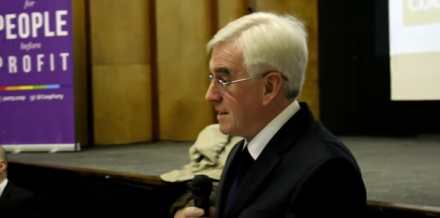
The New Economics debate series, announced by John McDonnell earlier this month, formally launched on Tuesday with a powerhouse lecture by Mariana Mazzucato, a member of Labour’s star-studded Economic Advisory Committee.
The series promises to provide the raw materials with which Labour can build a new political economy, something sorely lacking since last May’s defeat- and, some would argue, since long before then.
Mazzucato is a fine standard-bearer for the initiative: fiercely intelligent, eloquent, and effortlessly charming, I doubt I was only one in the room who wished she could bat for Labour on the economy at every Question Time between now and May 2020.
Yet Labour doesn’t need another politician – it needs ideas, and it was Mazzucato’s that John McDonnell and Jeremy Corbyn, who were both in attendance, had come to plunder.
Mazzucato’s central contention is that the state has been badly miscast as the pantomime villain of capitalism by free market ideologues- so much so that public discourse has all but erased any mention of the essential role government plays in stimulating private enterprise.
Yet “if you look at the history of capitalism…It actually requires a lot of thinking outside the box- also from the public sector,” she said.
The beneficence of this ‘entrepreneurial state’, as she terms it, abounds at every turn. The iPhone, for example, owes many of its innovations to US-government investment in technologies originally destined for the military, which then percolated down to the private sector. Similarly, Google’s search algorithm was developed with funding from the US National Science Foundation.
This state activism, though, has not received the credit it deserves in a public conversation dominated by those who say government should only intervene in markets in the event of failure. The rest of the time, they say, it should stay the hell out of the way.
A key task of progressive parties, then, is to debunk this “cartoon image”, as Mazzucato called it, of a bumbling public sector fit only to administrate, rather than innovate.
Then, the real work can begin on forging a new narrative on wealth creation, one which places the public sector firmly at its heart- not as a dead hand stifling enterprise, but as an exciting partner of the private sector: providing seed capital, research funding, and the sort of “patient, long-term, committed finance” early stage companies need in order to thrive.
This conception of the state is far removed from the old socialist dogma of nationalisation. In fact, Mazzucato did not mention full – scale nationalisation once as a tool to stimulate a new economy.
However, she did make the case for the state to develop a system for socialising the gains of its investments, rather than just the losses. After all, if taxpayers foot the bill for failed state-backed enterprises- like Concorde, for instance- they should reap the windfall of successful ones, like Tesla Motors in the US.
The entrepreneurial state must also be “mission-orientated” if it is to score more successes than failures in its investment portfolio. Mazzucato says the focus should therefore be on “growth that is “smart (innovation led), growth that is inclusive, (that produces less not more inequality) and growth that is sustainable.”
However, movers and shakers in government and business have not been prepared to talk about the “immense policy making” required to “tilt the playing field” towards this sort of growth, she says.
This must be Labour’s task: to start the conversation on a state that acts as an economic dynamo alongside the private sector, rather than as a cumbersome administrator or feckless CEO of nationalised entities.
It’s a tall order, and Mazzucato made no bones about the difficulties associated with making the case for the entrepreneurial state in these febrile political times.
John McDonnell, who sat rapt to attention throughout, has a lot of work to do.




More from LabourList
Tom Belger column: ‘Why is Labour making migrant exploitation easier?’
Ashley Dalton resigns as health minister for cancer treatment
Paul Nowak column: ‘Labour must focus on the basics’